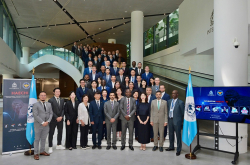Transnational financial crime has grown exponentially in recent years, undermining global financial systems, impeding economic growth and causing huge losses to businesses and individuals worldwide. Corruption adds to the complexity of the problems, creating a fertile ground for organized criminal activities.
Taking advantage of globalization and digitization processes, criminals are able to commit financial crimes with increasing efficiency and sophistication. The COVID-19 pandemic has demonstrated the speed with which criminal groups can modify their methods to take advantage of new opportunities for defrauding individuals and companies, for example, through phone fraud, phishing, non-delivery fraud, investment fraud and payment card fraud.
Financial crime and corruption are major issues not only for the law enforcement community, but also for financial institutions, the private sector and other international stakeholders.
Centralizing the international response
Given the urgent need for a coordinated international response, we have established IFCACC. This major new crime programme will expand and streamline our existing initiatives in tackling financial crimes, illicit money flows and asset recovery.
Adopting a multi-agency approach, IFCACC will work closely with key stakeholders to strengthen our collective efforts against financial crime and corruption. These stakeholders include the Financial Action Task Force (FATF), the FATF-Style Regional Bodies (FSRBs), the Egmont Group of Financial Intelligence Units, law enforcement agencies, police organizations and the financial sector.
Areas of action
- Fraud and payment crime
IFCACC will support member countries in their transnational investigations, and will share significant modus operandi with relevant stakeholders. - Anti-money laundering and asset recovery
IFCACC will bring a multi-disciplinary response to target global illicit financial flows. We will focus on different types of money laundering schemes and the use of virtual assets as well as identification of criminal assets and forfeiture. - Anti-corruption
Our efforts against corruption will span various crime types, including doping in sport, the corruption of public officials, and grand corruption (involving senior political figures). IFCACC will strengthen our member countries’ ability to combat grand corruption both nationally and internationally.
Our capabilities
- Investigative support: We will support member countries by crosschecking data against INTERPOL databases and provide case mentoring, global outreach and coordination support. IFCACC will coordinate multijurisdictional investigations via our National Central Bureaus in 196 member countries.
- Operational support: We will coordinate regional and global operations and action days against transnational financial crimes threats. Operational support teams can be immediately deployed to member countries to support ongoing investigations
- Analytical support: We will focus our efforts on emerging criminal threats and transnational organized crime groups through our dedicated Financial Crime Analysis File (FinCAF). The Centre will work with member countries to strengthen the overall tactical response to international organized crime.
- Capacity building: We will conduct tailored training sessions to equip law enforcement officers and Financial Intelligence Units (FIUs) with the knowledge, skills and best practices to meet today’s financial crime threats.
- Information and alerts: In addition to our existing global and regional conferences, we will publish reports and guidelines to highlight the latest crime trends and current best investigative practice. We also use INTERPOL’s colour-coded Notices to circulate details of new and existing criminal trends related to financial crime, money laundering and grand corruption.
- Thematic projects: Supported by our international partners, we lead multi-year regional and global initiatives to focus on illicit financial flows linked to a variety of predicate crimes (those crimes that generate proceeds which are then laundered). Such crimes include fraud, drug trafficking, environmental crime, human trafficking, etc. These projects draw on the areas of support described above to deliver a comprehensive response to specific issues and develop effective networks against the latest threats involving financial crime and money laundering.










